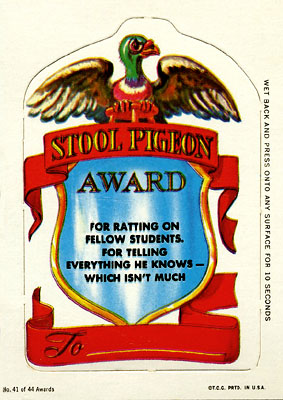My Take on Fines (and why we need something better).
 PEOPLE ARE STEALING FROM THE LIBRARY! Everyday, in every library across the world (maybe a little exaggeration there) people steal from the library. Seeing as how you pay for and are a community owner of the library, they are, by extension, stealing from you! Why are you putting up with it?
PEOPLE ARE STEALING FROM THE LIBRARY! Everyday, in every library across the world (maybe a little exaggeration there) people steal from the library. Seeing as how you pay for and are a community owner of the library, they are, by extension, stealing from you! Why are you putting up with it?
As I've mentioned in my other post, libraries have fines as a method for ensuring equal access to public materials. If you damage a library item, you have to pay for it. If you lose a library item, you have to pay for it. If you are late bringing a library item back, you have to pay for it... maybe, sometimes, depending on who's working that day and what the item is and how many times you've returned other materials late. Oh yeah, and if you smile or have good bartering or lying skills. Now, I don't think these fines work. Let's examine two reasons why.
First, it is extremely hard to explain to people why they have to pay money when they turned a book in late if no one else wants it. On top of that, often all they had to do to save money was call or go online and renew the item. The theory behind this is very philosophical, and hard to wrap your head around. The practical side of this is just plain silly. These are the fines that I have no problem waiving.
Second, once patrons reach a fine level that prevents them from checking out (or rather they must pay more money than they are willing in order to check out) they simply quit coming to the library to check things out. Someone with a $30 fine will probably just let that sit and nothing will ever come from it until many years later when they need the library again. In these cases, often times this fine is waived due to age and lost information from every new records management system the library has used over this timespan.
Neither one of these are stealing, though the second reason often coincides with library theft. When I did mention stealing before, admittedly much like a local news broadcast will lead with how the dirt on the bottom of your purse could kill you, I was a little misleading. Let me define the theft of which I wrote. This is not the "shrinkage" that retail stores deal with. This is not shoplifting and pocketing of DVDs and Cds that bypass security and simply disappear. Instead, I mean people check out items and never bring them back. Most libraries have those patrons with hundreds and hundreds of dollars worth of fines for "lost" materials. In my book, whenever someone borrows something and never returns it, they stole it. This is the type of theft that goes on everyday, and no one seems to care!
The only punishment these thieves receive is to limit them from using library materials at home. They can still come in and read our books, sit in our chairs, use our restrooms, check their e-mail on our computers, etc., even though they stole from us and we know it! This is really why fines don't work. We need to treat these people (ok, only those that don't pay for what they've lost. Many of these people will pay or replace the item.) just as if they stuck the DVD in their backpack and bolted out the door. They are theives, plain and simple. Why doesn't anyone see this?!







